- Home
- George R. R. Martin
Wild Cards: Inside Straight
Wild Cards: Inside Straight Read online
Table of Contents
Title Page
Copyright Page
Acknowledgements
PREFACE
THE PRIZE OF PERIL
ANDA’S GAME
LADIES AND GENTLEMEN, THIS IS YOUR CRISIS!
STROBOSCOPIC
SYNTHETIC SERENDIPITY
HOW WE GOT IN TOWN AND OUT AGAIN
RED SONJA AND LESSINGHAM IN DREAMLAND
THE HALFWAY HOUSE AT THE HEART OF DARKNESS
HER OWN PRIVATE SITCOM
THE ICHNEUMON AND THE DORMEUSE
WINNING MARS
Let the games begin . . .
Over forty years ago, Robert Sheckley’s “The Prize of Peril” was perhaps the first story to predict reality TV, as a man on a television show must try to stay alive for one week—while eluding hunters out to kill him.
Kate Wilhelm’s brilliant, amazingly prescient “Ladies and Gentlemen, This Is Your Crisis!” depicts a “Survivor”-type reality-based TV show and its obsessed audience.
Allen Steele’s “Her Own Private Sitcom” shows that everyone can become a star on reality TV—and what happens when their fans become disgusted with their narcissistic ways.
Alastair Reynolds’s taut, fast-paced “Stroboscopic” merges computer games and daredevil exhibitions to produce a sport in which everything can change in the blink of an eye—sometimes with fatal results.
Jonathan Lethem’s “How We Got in Town and Out Again” looks at an impoverished future America desperate for entertainment—and the down-and-outers desperate enough to provide it for them.
Vernor Vinge’s “Synthetic Serendipity” shows us a rapidly approaching future in which the older generation is obsolete against tech-savvy Whiz Kids, who prove that boys will still be boys—especially when there are dangerous games to be played . . .
THE BERKLEY PUBLISHING GROUP
Published by the Penguin Group
Penguin Group (USA) Inc.
375 Hudson Street, New York, New York 10014, USA
Penguin Group (Canada), 90 Eglinton Avenue East, Suite 700, Toronto, Ontario M4P 2Y3, Canada
(a division of Pearson Penguin Canada Inc.)
Penguin Books Ltd., 80 Strand, London WC2R 0RL, England
Penguin Group Ireland, 25 St. Stephen’s Green, Dublin 2, Ireland (a division of Penguin Books Ltd.)
Penguin Group (Australia), 250 Camberwell Road, Camberwell, Victoria 3124, Australia
(a division of Pearson Australia Group Pty. Ltd.)
Penguin Books India Pvt. Ltd., 11 Community Centre, Panchsheel Park, New Delhi—110 017, India
Penguin Group (NZ), 67 Apollo Drive, Mairangi Bay, Auckland 1311, New Zealand
(a division of Pearson New Zealand Ltd.)
Penguin Books (South Africa) (Pty.) Ltd., 24 Sturdee Avenue, Rosebank, Johannesburg 2196,
South Africa
No part of this book may be reproduced, scanned, or distributed in any printed or electronic form without permission. Please do not participate in or encourage piracy of copyrighted materials in violation of the author’s rights. Purchase only authorized editions.
For information address: The Berkley Publishing Group,
a division of Penguin Group (USA) Inc.,
375 Hudson Street, New York, New York 10014.
eISBN : 978-1-429-56960-6
ACKNOWLEDGMENT IS MADE FOR PERMISSION TO REPRINT THE FOLLOWING MATERIAL:
“The Prize of Peril,” by Robert Sheckley. Copyright © 1958 by Mercury Press, Inc. First published in The Magazine of Fantasy & Science Fiction, May 1958. Reprinted by permission of the author’s estate.
“Anda’s Game,” by Cory Doctorow. Copyright © 2004 by Cory Doctorow. First published electronically in Salon, November 15, 2004. Reprinted by permission of the author.
“Ladies and Gentlemen, This Is Your Crisis!,” by Kate Wilhelm. Copyright © 1976 by Damon Knight. First published in Orbit 18 (Putnam), edited by Damon Knight. Reprinted by permission of the author.
“Stroboscopic,” by Alastair Reynolds. Copyright © 1998 by Interzone. First published in Interzone, August 1998. Reprinted by permission of the author.
“Synthetic Serendipity,” by Vernor Vinge. Copyright © 2004 by Vernor Vinge. First published electronically on IEEESpectrumonline, July 31, 2005. Reprinted by permission of the author.
“How We Got in Town and Out Again,” by Jonathan Lethem. Copyright © 1996 by Dell Magazines. First published in Asimov’s Science Fiction, September 1996. Reprinted by permission of the author.
“The Halfway House at the Heart of Darkness,” by William Browning Spencer. Copyright © 1998 by William Browning Spencer. First published in Lord of the Fantastic (Avon Eos), edited by Martin H. Greenberg. Reprinted by permission of the author.
“Her Own Private Sitcom,” by Allen Steele. Copyright © 1999 by Dell Magazines. First published in Analog Science Fiction and Fact, January 1999. Reprinted by permission of the author.
“The Ichneumon and the Dormeuse,” by Terry Dowling. Copyright © 1996 by Interzone. First published in Interzone, April 1996. Reprinted by permission of the author.
“Winning Mars,” by Jason Stoddard. Copyright © 2005 by Interzone . First published in Interzone, January/February 2005. Reprinted by permission of the author.
PREFACE
Playing games is one of the things that makes us human, and goes back thousands of thousands of years into the blurry depths of prehistory; games resembling chess and checkers and Go or “Chinese checkers” have been found in the ruins of vanished civilizations from Egypt to China to Sumer, and crude dice made from animal bones have been found in caves lived in by Ice Age hunters. Who knows what games were played that left no trace behind in the archeological record? My guess is that some sort of chase-and-catch games, the ancestors of soccer and football, were played wherever there were the combination of good summer weather, an empty meadow, and restless hunters still charged up from the hunt, and those long nights huddled around an Ice Age fire had to be filled somehow, if not with dice, then with cards (which probably would leave no trace behind, but which likely have a heritage almost as old as dice), or word-games, or the kinds of finger-games such as “Paper, Scissors, Stone” or “Thumb War” that may well go back to a time before there were such things as paper or scissors (“Mammoth, Spear, Stone,” perhaps?).
All games are competitions, though, which implies a winner and a loser. And the best games are those that have an element of risk involved in them. The more dangerous they are, in fact, the more the loser has at stake, the better we like them. And the ultimate stake is life itself.
Even today, in spite of living in a safety-obsessed culture where every jar and bottle has a warning label on it and every car comes equipped with air-bags and seat-belts—or maybe because we live in such a culture—people like dangerous games, as witness the development and sudden popularity of “Extreme Sports,” and the more dangerous they are, the more popular they are as well. It only takes a slight heightening of conditions to imagine a game where there’s not just risk, but a certainty of death for one competitor or another, like the Roman gladiatorial games, and science fiction writers have been coming up with just such scenarios, like Frederic Pohl and C.M. Kornbluth’s Gladiator-At-Law, for decades now.
Another parallel social development predicted long ago by SF writers is the “Reality Show,” and stories such as Robert Sheckley’s “The Prize of Peril” and “The Seventh Victim” and Kate Wilhelm’s “Ladies and Gentlemen, This Is Your Crisis!” that strongly resemble shows such as Survivor , were around long before “reality television” was even a gleam in a TV producer’s eye. As was the idea that every moment of your life would not only be observed bu
t would become fodder for entertainment television. This is a version of 1984 that never occurred to Orwell—that people would not only want Big Brother to watch them, but that other people would find it fascinating to watch too, so that today you not only are watched by security cameras every time you go into a bank or a store or a gas station or even walk down the street—with nobody objecting to this—but people willingly take web-cams into their bedrooms as well and record themselves having sex to broadcast to wide audiences on the internet. Some of the most popular shows on television involve “ordinary people” under 24-hour-a-day scrutiny by the cameras.
All this seems weird enough to old dinosaurs like your editors who grew up in the ’50s, but where is it going to go and what’s going to happen next, in the future? Our intuition is that you ain’t seen nothing yet.
So open up this book and let some of SF’s most expert dreamers show you eleven extreme and radical games that people in the future will play. Dangerous games. Games more addictive than heroin, and just as deadly. Games that will take you completely out of this world and into fantastical and fabulous realms of your own creation, where the dangers are still as real as a knife in the dark. Games that will become the hit TV shows of the future and will boil couch potatoes everywhere in their skins. Games that affect reality itself, where your success or failure in life depends on your gaming skills. Games that will take you to Mars and to the icy darkness of the outer Solar System. Games that you can’t stop playing, even if you want to.
Dangerous games. Games to die for—quite literally.
Enjoy! The game is afoot!
THE PRIZE OF PERIL
Robert Sheckley
The late Robert Sheckley was one of science fiction’s premiere satirists and humorists, rivaled for that title only by Kurt Vonnegut and Douglas Adams (who was himself clearly influenced by Sheckley), and he was more prolific than either of them, particularly at shorter lengths, turning out hundreds of short stories over the course of his fifty-three year career. Sheckley sold his first novel, Immortality, Inc., in 1958, and followed it up over the years with other novels such as Dimension of Miracles, Mindswap, The Status Civilization, Journey Beyond Tomorrow, Watchbird, Journey of Joenes, The 10th Victim, Hunter/Victim, Victim Prime, and Godshome. He has also written five mystery novels as Stephen Dain, three “Hob Draconian” mysteries under his own name, a Babylon 5 novel, and three novels in collaboration with Roger Zelazny, Bring Me the Head of Prince Charming, A Farce to Be Reckoned With, and If at Faust You Don’t Succeed. His many short stories have been collected in Can You Feel Anything When I Do This?, Citizen in Space, Notions: Unlimited, The People Trap and Other Pitfalls, Pilgrimage to Earth, Shards of Space, The Robot Who Looked Like Me, Untouched by Human Hands, and others. His last book was a massive retrospective collection, The Masque of Manana. He was named Author Emeritus by the Science Fiction Writers of America in 2001. He died in 2005.
Two of his most famous stories, “The Seventh Victim” and the story that follows, “The Prize of Peril,” predicted the twin crazes of reality TV and Adventure Gaming more than forty years before they actually came into existence—and still bear palpable stings in their sleek and shiny tails even to this very day.
Now he knew about the alley. It was guarded, just like the door.
He lay at full length on the cracked linoleum, staring at the bullet hole in the ceiling, listening to the sounds outside the door. He was a tall man with bloodshot eyes and a two-day stubble. Grime and fatigue had etched lines into his face. Fear had touched his features, tightening a muscle here and twitching a nerve there. The results were startling. His face had character now, for it was reshaped by the expectation of death.
There was a gunman in the alley and two on the stairs. He was trapped. He was dead.
Sure, Raeder thought, he still moved and breathed, but that was only because of death’s inefficiency. Death would take care of him in a few minutes. Death would poke holes in his face and body, artistically dab his clothes with blood, arrange his limbs in some grotesque position of the graveyard ballet . . .
Raeder bit his lip sharply. He wanted to live. There had to be a way.
He rolled onto his stomach and surveyed the dingy cold-water apartment into which the killers had driven him. It was a perfect little one-room coffin. It had a door, which was watched, and a fire escape, which was watched. And it had a tiny windowless bathroom.
He crawled to the bathroom and stood up. There was a ragged hole in the ceiling, almost four inches wide. If he could enlarge it, crawl through into the apartment above . . .
He heard a muffled thud. The killers were impatient. They were beginning to break down the door.
He studied the hole in the ceiling. No use even considering it. He could never enlarge it in time.
They were smashing against the door, grunting each time they struck. Soon the lock would tear out, or the hinges would pull out of the rotting wood. The door would go down, and the two blank-faced men would enter, dusting off their jackets . . .
But surely someone would help him! He took the tiny television set from his pocket. The picture was blurred, and he didn’t bother to adjust it. The audio was clear and precise.
He listened to the well-modulated voice of Mike Terry addressing his vast audience.
“. . . terrible spot,” Terry was saying. “Yes, folks, Jim Raeder is in a truly terrible predicament. He had been hiding, you’ll remember, in a third-rate Broadway hotel under an assumed name. It seemed safe enough. But the bellhop recognized him, and gave that information to the Thompson gang.”
The door creaked under repeated blows. Raeder clutched the little television set and listened.
“Jim Raeder just managed to escape from the hotel! Closely pursued, he entered a brownstone at one fifty-six West End Avenue. His intention was to go over the roofs. And it might have worked, folks, it just might have worked. But the roof door was locked. It looked like the end . . . But Raeder found that apartment seven was unoccupied and unlocked. He entered . . .”
Terry paused for emphasis, then cried—“and now he’s trapped there, trapped like a rat in a cage! The Thompson gang is breaking down the door! The fire escape is guarded! Our camera crew, situated in a nearby building, is giving you a close-up now. Look, folks, just look! Is there no hope for Jim Raeder?”
Is there no hope? Raeder silently echoed, perspiration pouring from him as he stood in the dark, stifling little bathroom, listening to the steady thud against the door.
“Wait a minute!” Mike Terry cried. “Hang on, Jim Raeder, hang on a little longer. Perhaps there is hope! I have an urgent call from one of our viewers, a call on the Good Samaritan Line! Here’s someone who thinks he can help you, Jim. Are you listening, Jim Raeder?”
Raeder waited, and heard the hinges tearing out of rotten wood.
“Go right ahead, sir,” said Mike Terry. “What is your name, sir?”
“Er—Felix Bartholemow.”
“Don’t be nervous, Mr. Bartholemow. Go right ahead.”
“Well, okay. Mr. Raeder,” said an old man’s shaking voice, “I used to live at one five six West End Avenue. Same apartment you’re trapped in, Mr. Raeder—fact! Look, that bathroom has got a window, Mr. Raeder. It’s been painted over, but it has got a—”
Raeder pushed the television set into his pocket. He located the outlines of the window and kicked. Glass shattered, and daylight poured startlingly in. He cleared the jagged sill and quickly peered down.
Below was a long drop to a concrete courtyard.
The hinges tore free. He heard the door opening. Quickly Raeder climbed through the window, hung by his fingertips for a moment, and dropped.
The shock was stunning. Groggily he stood up. A face appeared at the bathroom window.
“Tough luck,” said the man, leaning out and taking careful aim with a snub-nosed .38.
At that moment a smoke bomb exploded inside the bathroom.
The killer’s shot went wide. He turned, cur
sing. More smoke bombs burst in the courtyard, obscuring Raeder’s figure.
He could hear Mike Terry’s frenzied voice over the TV set in his pocket. “Now run for it!” Terry was screaming. “Run, Jim Raeder, run for your life. Run now, while the killers’ eyes are filled with smoke. And thank Good Samaritan Sarah Winters, of three four one two Edgar Street, Brockton, Mass., for donating five smoke bombs and employing the services of a man to throw them!” In a quieter voice, Terry continued. “You’ve saved a man’s life today, Mrs. Winters. Would you tell our audience how it—” Raeder wasn’t able to hear any more. He was running through the smoke-filled courtyard, past clotheslines, into the open street.
“Hey, you!”
Raeder turned. A middle-aged woman was sitting on the steps of a brownstone, frowning at him.
“You’re Raeder, aren’t you? The one they’re trying to kill?”
Raeder started to walk away.
“Come inside here, Raeder,” the woman said.
Perhaps it was a trap. But Raeder knew that he had to depend upon the generosity and good-heartedness of the people. He was their representative, a projection of themselves, an average guy in trouble. Without them, he was lost. With them, nothing could harm him.
Trust in the people, Mike Terry had told him. They’ll never let you down.
He followed the woman into her parlor. She told him to sit down and left the room, returning almost immediately with a plate of stew. She stood watching him while he ate, as one would watch an ape in the zoo eat peanuts.
Two children came out of the kitchen and stared at him. Three overalled men came out of the bedroom and focused a television camera on him. There was a big television set in the parlor. As he gulped his food, Raeder watched the image of Mike Terry and listened to the man’s strong, sincere, worried voice.
“There he is, folks,” Terry was saying. “There’s Jim Raeder now, eating his first square meal in two days. Our camera crews have really been working to cover this for you! Thanks, boys . . . Folks, Jim Raeder has been given a brief sanctuary by Mrs. Velma O’Dell, of three forty-three Sixty-Third Street. Thank you, Good Samaritan O’Dell! It’s really wonderful how people from all walks of life have taken Jim Raeder to their hearts!”

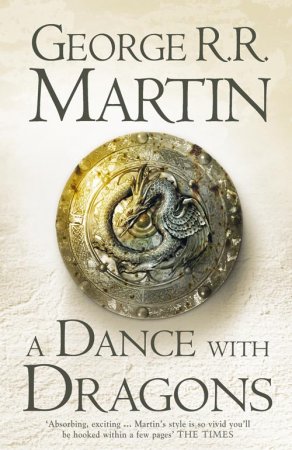 A Dance with Dragons
A Dance with Dragons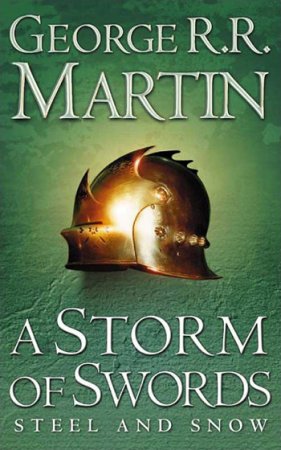 A Storm of Swords
A Storm of Swords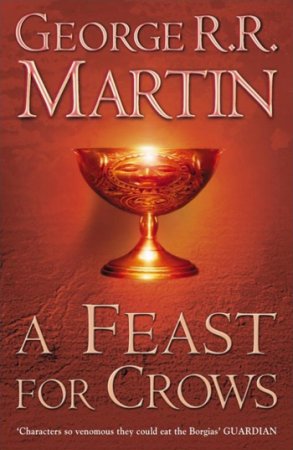 A Feast for Crows
A Feast for Crows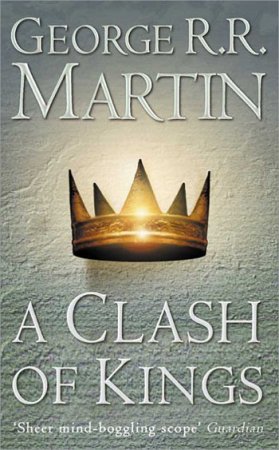 A Clash of Kings
A Clash of Kings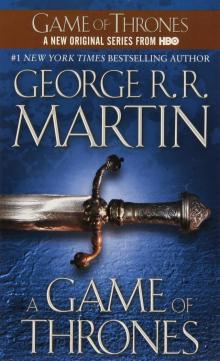 A Game of Thrones
A Game of Thrones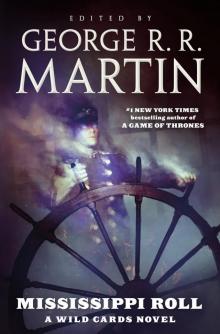 Mississippi Roll
Mississippi Roll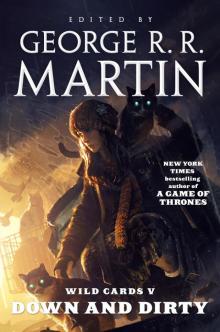 Wild Cards V: Down and Dirty
Wild Cards V: Down and Dirty Busted Flush
Busted Flush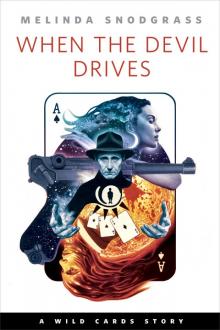 When the Devil Drives
When the Devil Drives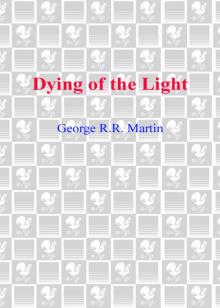 Dying of the Light
Dying of the Light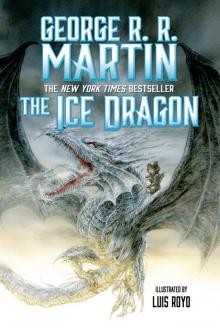 The Ice Dragon
The Ice Dragon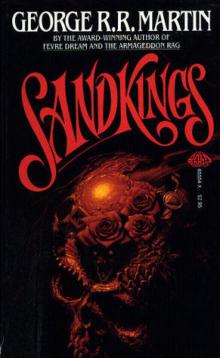 Sandkings
Sandkings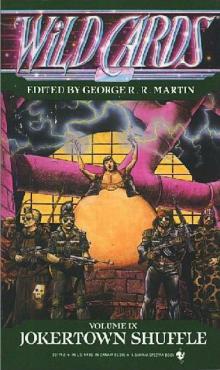 Jokertown Shuffle
Jokertown Shuffle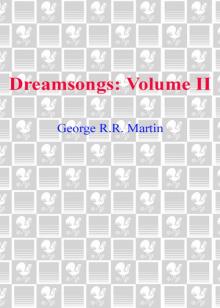 Dreamsongs. Volume II
Dreamsongs. Volume II Deuces Down
Deuces Down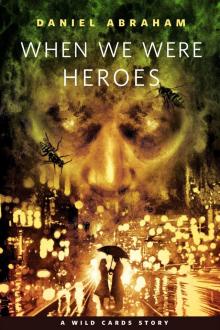 When We Were Heroes
When We Were Heroes Warriors
Warriors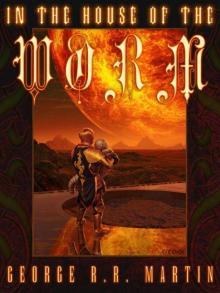 In the House of the Worm
In the House of the Worm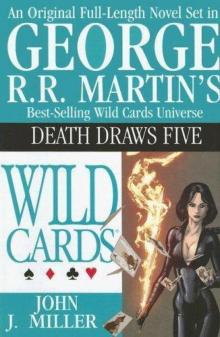 Death Draws Five
Death Draws Five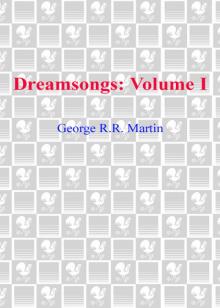 Dreamsongs. Volume I
Dreamsongs. Volume I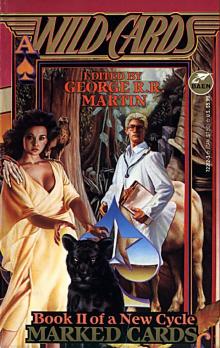 Marked Cards
Marked Cards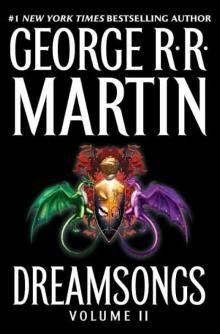 Dreamsongs
Dreamsongs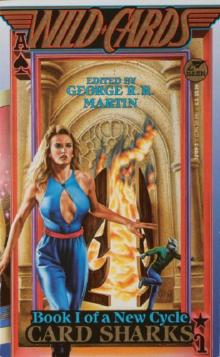 Card Sharks
Card Sharks Dangerous Women
Dangerous Women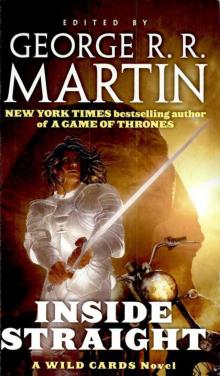 Inside Straight
Inside Straight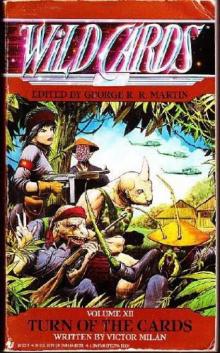 Turn of the Cards
Turn of the Cards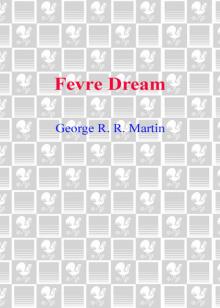 Fevre Dream
Fevre Dream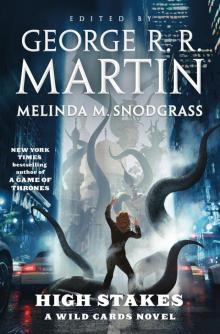 High Stakes: A Wild Cards Novel
High Stakes: A Wild Cards Novel Windhaven
Windhaven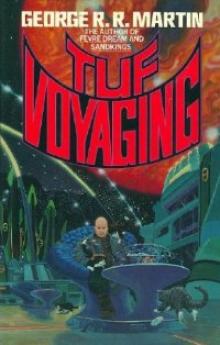 Tuf Voyaging
Tuf Voyaging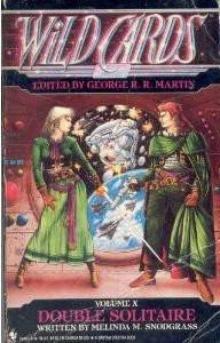 Double Solitaire
Double Solitaire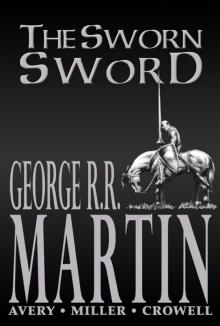 The Sworn Sword
The Sworn Sword Low Chicago
Low Chicago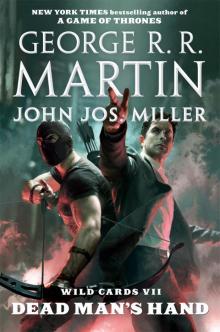 Dead Man's Hand
Dead Man's Hand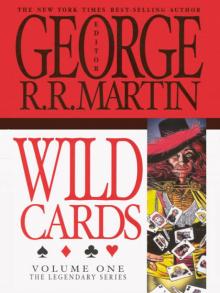 Wild Cards
Wild Cards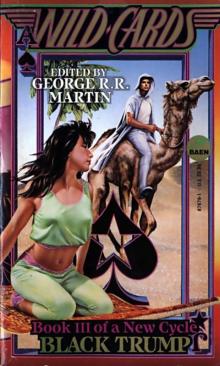 Black Trump
Black Trump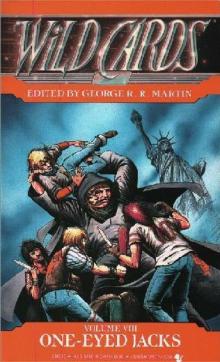 One Eyed Jacks
One Eyed Jacks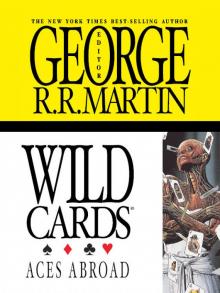 Wild Cards: Aces Abroad
Wild Cards: Aces Abroad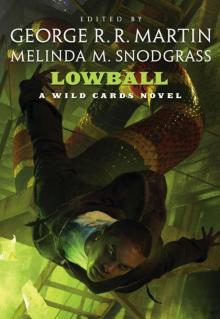 Lowball: A Wild Cards Novel
Lowball: A Wild Cards Novel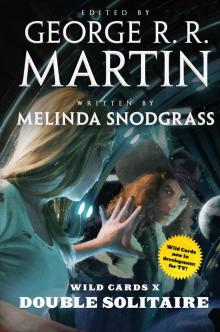 Double Solitaire (2019 Edition)
Double Solitaire (2019 Edition)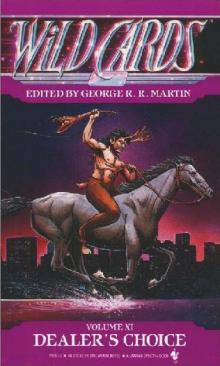 Dealer's Choice
Dealer's Choice Ace in the Hole
Ace in the Hole A Song for Lya: And Other Stories
A Song for Lya: And Other Stories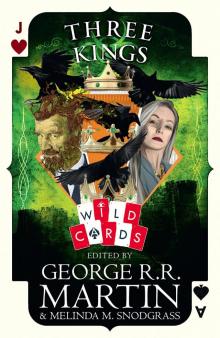 Three Kings
Three Kings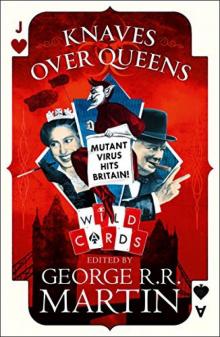 Knaves Over Queens
Knaves Over Queens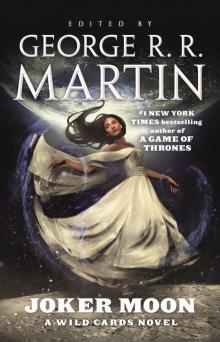 Joker Moon
Joker Moon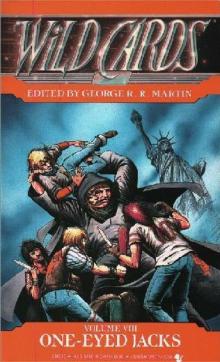 One Eyed Jacks wc-8
One Eyed Jacks wc-8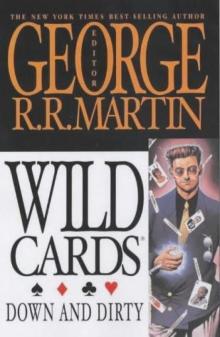 Down And Dirty wc-5
Down And Dirty wc-5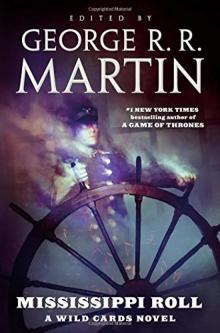 Mississippi Roll_A Wild Cards Novel
Mississippi Roll_A Wild Cards Novel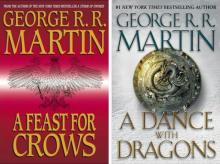 A Feast for Dragons
A Feast for Dragons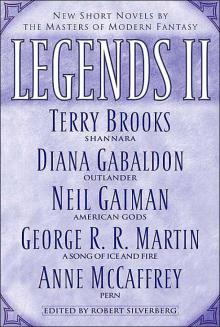 The Sworn Sword ttodae-2
The Sworn Sword ttodae-2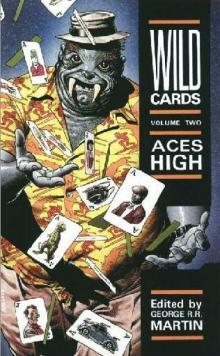 Aces High wc-2
Aces High wc-2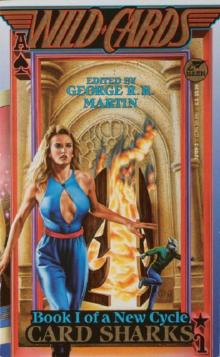 Wild Cards 13 : Card Sharks
Wild Cards 13 : Card Sharks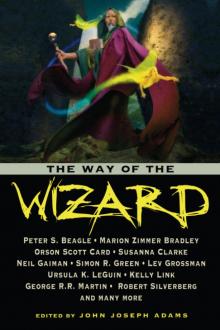 Way of the Wizard
Way of the Wizard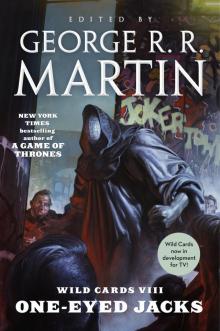 Wild Cards VIII: One-Eyed Jacks
Wild Cards VIII: One-Eyed Jacks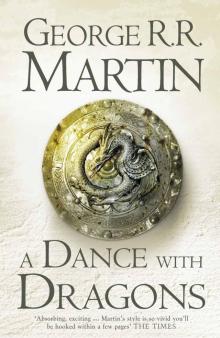 A Dance With Dragons: Book 5 of A Song of Ice and Fire (Song of Ice & Fire 5)
A Dance With Dragons: Book 5 of A Song of Ice and Fire (Song of Ice & Fire 5) The Princess and The Queen, Or, The Blacks and The Greens (a song of ice and fire)
The Princess and The Queen, Or, The Blacks and The Greens (a song of ice and fire)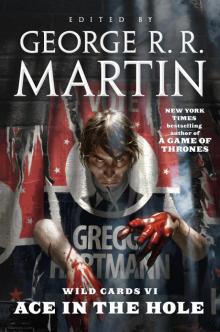 Wild Cards VI--Ace in the Hole
Wild Cards VI--Ace in the Hole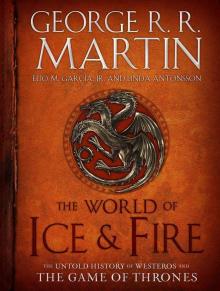 The World of Ice & Fire: The Untold History of Westeros and the Game of Thrones (A Song of Ice and Fire)
The World of Ice & Fire: The Untold History of Westeros and the Game of Thrones (A Song of Ice and Fire)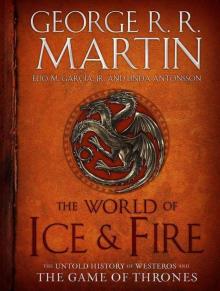 The World of Ice & Fire: The Untold History of Westeros and the Game of Thrones
The World of Ice & Fire: The Untold History of Westeros and the Game of Thrones Busted Flush wc-19
Busted Flush wc-19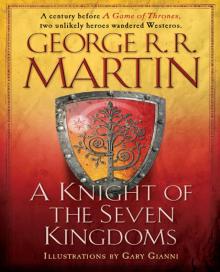 A Knight of the Seven Kingdoms
A Knight of the Seven Kingdoms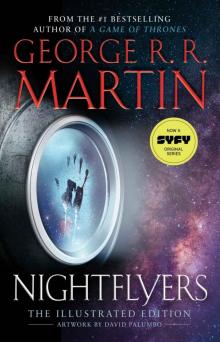 Nightflyers: The Illustrated Edition
Nightflyers: The Illustrated Edition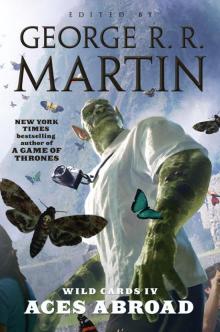 Wild Cards IV
Wild Cards IV Portraits of His Children
Portraits of His Children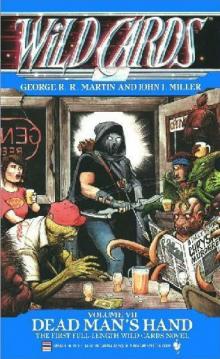 Dead Mans Hand wc-7
Dead Mans Hand wc-7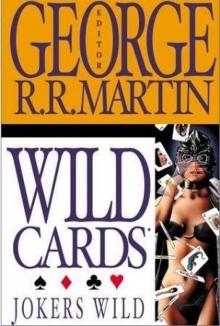 Jokers Wild wc-3
Jokers Wild wc-3 The Lonely Songs of Laren Dorr
The Lonely Songs of Laren Dorr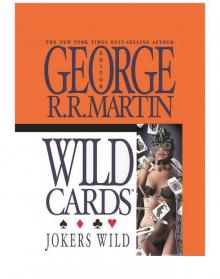 Wild Cards III: Jokers Wild
Wild Cards III: Jokers Wild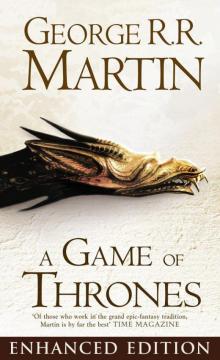 A Game of Thrones Enhanced Edition
A Game of Thrones Enhanced Edition Nightflyers & Other Stories
Nightflyers & Other Stories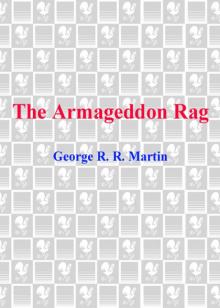 Armageddon Rag
Armageddon Rag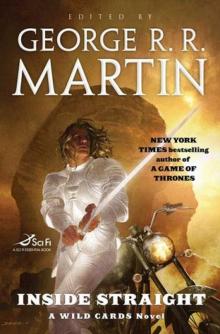 Wild Cards: Inside Straight
Wild Cards: Inside Straight A Song for Lya
A Song for Lya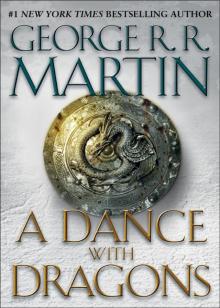 A Dance with Dragons: A Song of Ice and Fire: Book Five
A Dance with Dragons: A Song of Ice and Fire: Book Five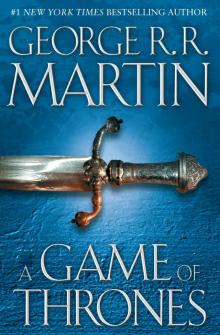 Song of Fire & Ice 01 - A Game of Thrones
Song of Fire & Ice 01 - A Game of Thrones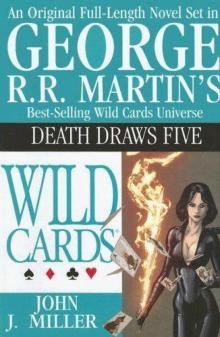 Death Draws Five wc-17
Death Draws Five wc-17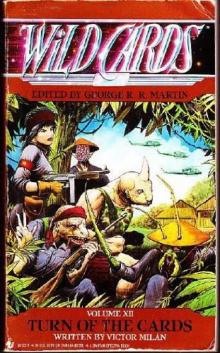 Turn of the Cards w-12
Turn of the Cards w-12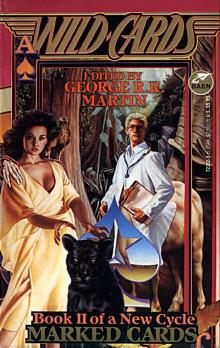 Wild Cards 14 - Marked Cards
Wild Cards 14 - Marked Cards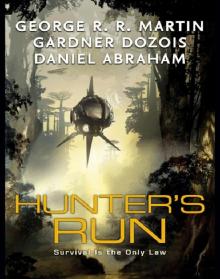 Hunter's Run
Hunter's Run The Glass Flower
The Glass Flower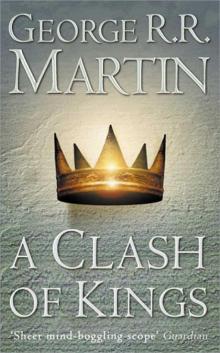 A Clash of Kings asoiaf-2
A Clash of Kings asoiaf-2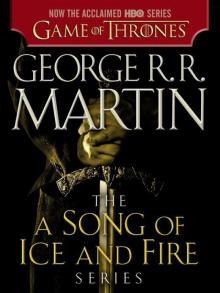 A Game of Thrones 5-Book Bundle: A Song of Ice and Fire Series: A Game of Thrones, A Clash of Kings, A Storm of Swords, A Feast for Crows, and A Dance with Dragons (Song of Ice & Fire)
A Game of Thrones 5-Book Bundle: A Song of Ice and Fire Series: A Game of Thrones, A Clash of Kings, A Storm of Swords, A Feast for Crows, and A Dance with Dragons (Song of Ice & Fire)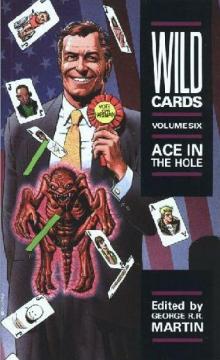 Ace In The Hole wc-6
Ace In The Hole wc-6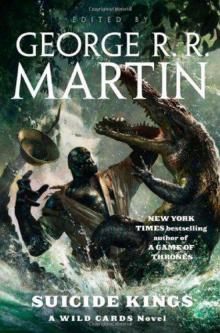 Suicide Kings wc-20
Suicide Kings wc-20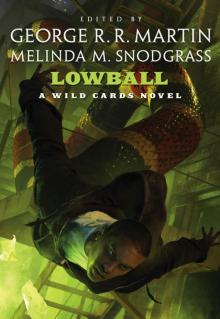 Lowball
Lowball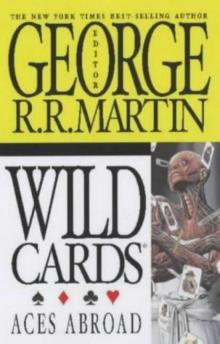 Aces Abroad wc-4
Aces Abroad wc-4 George R. R. Martin's a Game of Thrones 4-Book Bundle
George R. R. Martin's a Game of Thrones 4-Book Bundle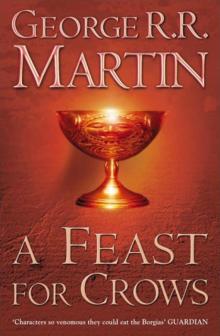 A Feast for Crows asoiaf-4
A Feast for Crows asoiaf-4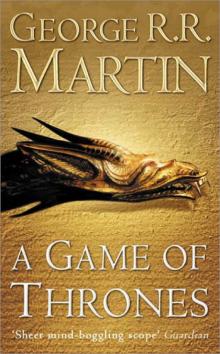 A Game of Thrones asoiaf-1
A Game of Thrones asoiaf-1 The Mystery Knight ttodae-3
The Mystery Knight ttodae-3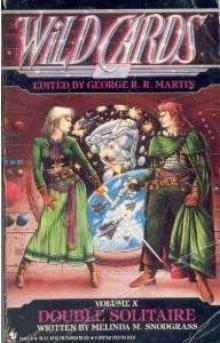 Double Solitaire w-10
Double Solitaire w-10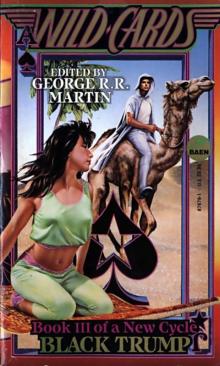 Wild Cards 15 - Black Trump
Wild Cards 15 - Black Trump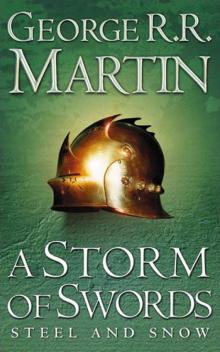 A Storm of Swords asoiaf-3
A Storm of Swords asoiaf-3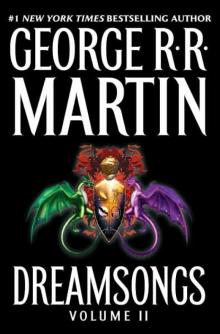 The Hedge Knight ttodae-1
The Hedge Knight ttodae-1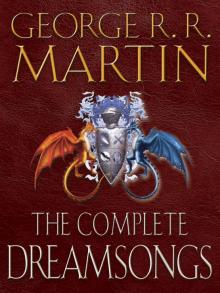 Dreamsongs 2-Book Bundle
Dreamsongs 2-Book Bundle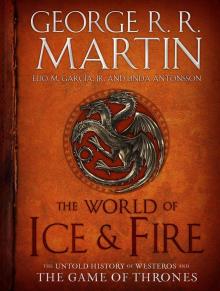 The World of Ice & Fire
The World of Ice & Fire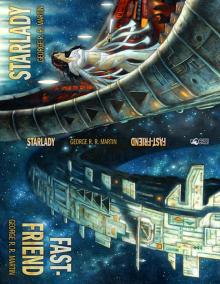 Starlady & Fast-Friend
Starlady & Fast-Friend Old Mars
Old Mars Fantasy For Good: A Charitable Anthology
Fantasy For Good: A Charitable Anthology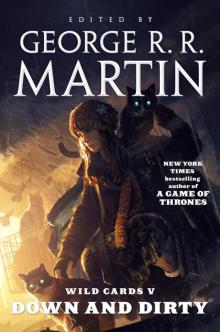 Wild Cards V
Wild Cards V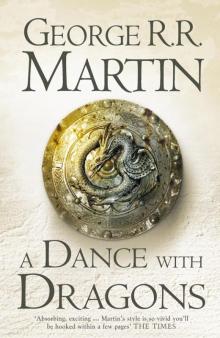 A Dance with Dragons asoiaf-5
A Dance with Dragons asoiaf-5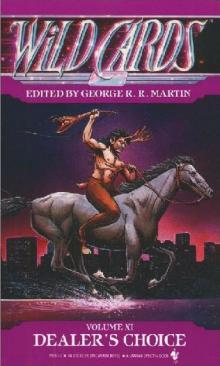 Dealer's Choice w-11
Dealer's Choice w-11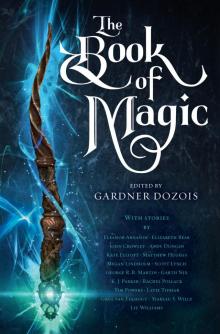 The Book of Magic
The Book of Magic A Game of Thrones 4-Book Bundle
A Game of Thrones 4-Book Bundle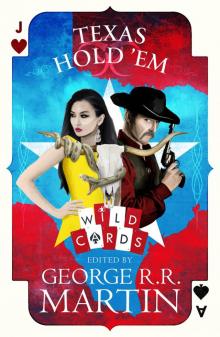 Texas Hold 'Em
Texas Hold 'Em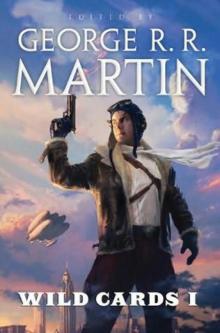 Wildcards wc-1
Wildcards wc-1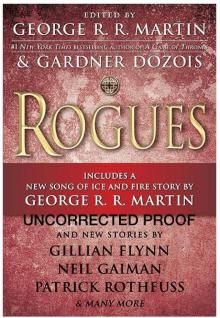 Rogues
Rogues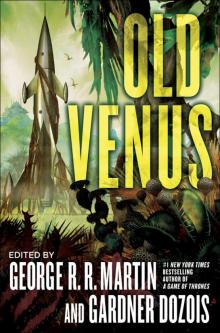 Old Venus
Old Venus